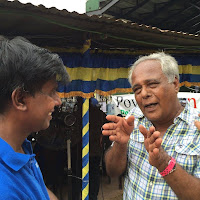Gabriel
José de la Concordia García Márquez wrote novels and short stories,
some would add ‘of epic proportion.’ His ‘One Hundred Years of
Solitude,’ has been hailed as an epic account of Latin American history
although the author never saw it as such.
Epic. The word is
associated with the heroic, with things grand in scale and character.
Originally, though, it just meant ‘song’ and sometimes ‘word’ or
‘story.’ So when someone uses the word to describe something
monumental, an act or event perhaps, the unsaid is that it is probably
amenable to poetic rendition, a long narrative poem or a story like the
Iliad, Odyssey or the Ramayana. Unsaid also is the inevitable hyperbole
and frivolous treatment of truth.
The word, anyway, makes us
think of larger than life characters or, put another way, people who
have considerably exceeded expectations, individuals who did or do the
unthinkable. Heroes. Kings and queens, princes and princesses. Giants.
Even gods as in the Greek ‘epics’ and the Mahabharata.
No, I am not saying that heroes are necessarily braggarts. I am not downplaying efforts that changed the course of history. I am not for a moment denying that individuals have contributed to the advancement of science, the well being of society and so on.
We must acknowledge, however, that individuals have unleashed all manner of disasters and tragedies. Many such individuals who, in the words of Rodion Romanovich Raskolnikov in Fyodor Dostoyevsky’s ‘Crime and Punishment’ have ‘shed blood which flows and has always flowed in streams, which is spilt like champagne, and for which men are crowned in the Capitol and are called afterwards benefactors of mankind.’
Raskolnikov’s conclusion is telling: ‘If I had succeeded I should have been crowned with glory, but now I'm trapped.’ This, sadly, is not atypical.
The key idea in all this is ‘the grand.’ For anything to be grand it must have visibility and wide public acknowledgement. The lilliputian stories of lilliputian men and lilliputian women in lilliputian social landscapes just don’t make the news unless it is some horrific crime that the general public can recoil in horror at. The word epic does not find its way into narratives about people and things of lilliputian dimensions.
Revisiting the work of Márquez lately, especially the fascinating interviews with the man and even more alluring, his biography, ‘Living to tell the tale,’ has made me reflect deeply on the epic-idea. It seems that his rich literary output was but an incredibly faithful recounting of things, processes and people he has encountered. Of course he has created composites of all kinds, merging characters, locations and stories, collapsing or stretching time. It’s fiction but the people, their lives and how they’ve unfolded is hardly fictional.
Years ago, a senior journalist conducting a training session for younger and less experienced colleagues, asked a simple question: ‘why are you in journalism?’ He told me that a 16 year old intern, Duranya, had come up with the best answer: ‘I want to write stories no one has written.’
There are people who live epic lives. Indeed all lives are epic. Only, they don’t put their encounters and reflections thereon into the form of novels or autobiographies. They don’t write in languages that are read, put another way. Their epics leave traces upon the paths they walk, the skins of people they walk with or stop to have a conversation with, the gravel which alone knows intimately the texture of their calloused feet.
There are no rules about writing biographies. Some get written and some do not. A few bold brush strokes can paint ‘epic’ on an otherwise not-so-heroic account. The lack of brush or simply the absence of need to be ‘biographied’ in the end means that there are innumerable strands left out of the overall grand narrative of humanity. This does not impoverish us, but it may render us less enriched.
['The Morning Inspection' is the title of a
column I wrote for the Daily News from 2009 to 2011, one article a day,
Monday through Saturday. This is a new series.]
Other articles in this series:
Between struggle and cooperation
Neruda, Sekara and literary dimensions
Paul Christopher's heart of many chambers
Calmness gracefully cascades in the Dumbara Hills
Serendipitous amber rules the world


.jpg)

0 comments:
Post a Comment